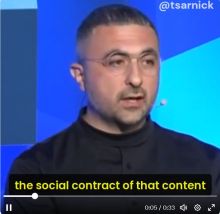Artificial silliness abounds

Mustafa Suleyman: video here
MICROSOFT "artificial intelligence" boss Mustafa Suleyman has maybe confessed to mass and "flagrant" breach of copyright. At the Aspen Ideas Festival in Colorado, US, Andrew Ross Sorkin of US TV chain CNBC asked Suleyman whether “AI companies have effectively stolen the world’s IP?”
His answer: “I think with respect to content that’s already on the open web, the social contract of that content since the ’90s has been that it is fair use. Anyone can copy it, recreate with it, reproduce with it. That has been ‘freeware’, if you like, that’s been the understanding.”
This is... so wrong. Of course it's an example of the common modus operandi of internet corporations: behave as though the law is what they would like it to be, then claim that the law should be changed to reflect the "custom and practice" that they seek to create. Or, as PayPal founder and Donald Trump donorPeter Thiel put it: "Don't ask for permission, ask for forgiveness later".
As a description of the law, Suleyman's statement is so wrong that - given the amount of legal advice to which he has access - it amounts to a declaration of intent deliberately to breach copyright. Arguably, therefore, it is a confession that Microsoft's breaches of copyright in Hoovering™ up works to "train" its machine-learning systems are, in the UK jargon, "flagrant" breaches.
Where a court finds that a breach is flagrant it can award extra damages. For a work that is registered in the US, section 504(c) of the US copyright law states: "In a case where the copyright owner sustains the burden of proving, and the court finds, that infringement was committed willfully, the court in its discretion may increase the award of statutory damages to a sum of not more than $150,000" - compared to the statutory damages between $750 and $30,000 per registered work infringed non-willfully.
That could be a very expensive speech.
All in vain, perhaps?
Inevitably, investment commentary on "artificial intelligence" is moving into the "did we over-sell it?" phase. A report from consultants Sequoia observes that at current rates of capital expenditure (CapEx) on the hardware to train and run machine-learning systems, "$200 billion of lifetime revenue would need to be generated" to pay it back - without allowing for any "margin" or profit. It is not clear where this may come from: "there’s a $125B+ hole that needs to be filled for each year of CapEx at today’s levels."
 'Artificial Intelligence' our coverage to date
'Artificial Intelligence' our coverage to date
![[Freelance]](../gif/fl3H.png)